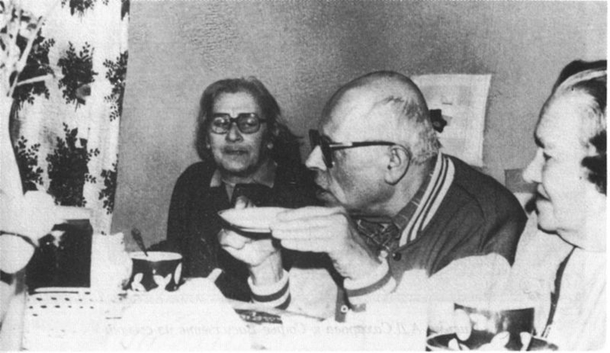Elena Bonner, the doyenne of Russia’s human rights and democracy movement, died in Boston on June 19. Her life was full of dramatic turns and twists that uncannily mirrored those of her country. Born Lusik Georgievna Alikhanova in 1923, Elena’s first recollections were of the ancient city of Merv, in Turkmenistan, where her mother, Ruf Bonner, had fled to escape the violence and uncertainty of the Russian civil war. Elena’s father, Gevork Alikhanyan, was a senior official in the Comintern, and she knew privilege as a result, sometimes enjoying, for instance, the small luxuries of the Hotel Luks on Moscow’s Gorky Street. But she also knew hardship, growing up in the remote Siberian city of Chita, and she came to know oppression. Her parents, both old Bolsheviks, suffered terribly as the Revolution began to devour its children: her father was executed in the purges of 1938, while her mother was dispatched to a labor camp in Kazakhstan for eight years. During the war, Elena served as a nurse on hospital trains, and was wounded twice. When it was over, she completed formal studies in medicine in Leningrad.
Scott Horton served as counsel to Elena Bonner and Andrei Sakharov, among other activists from the former Soviet Union. This post is based on remarks he delivered at Bonner’s funeral in Brookline, Massachusetts, on June 21, 2011.
Elena was a skillful raconteuse. Once, she was dispatched to Anna Akhmatova’s house to administer shots. You might imagine scintillating conversation passing between the two greatest women to come out of Leningrad during the twentieth century, but as Elena recalled the meeting, the renowned poet simply bared her fish-belly-white buttocks, received the shot, groaned with pain, and waited for the agent of her misery to disappear. (The incident never diminished Elena’s affection for Akhmatova’s poetry, but her true love was reserved for Pushkin.)
Other stories had a more serious purpose. In the late fifties, Elena served on a medical mission in Iraq, where she was called to the side of a senior Iraqi official who had been wounded during an attempted coup. She was cautioned not to offer medical assistance until Moscow could decide whether it wanted the victim to survive. The incident caused her to sharply question whether the Party was “always right,” given its frequently inhumane and unethical conduct.
During the Sixties, Elena’s criticism of the Communist state became progressively more vocal, and in 1970, she traveled to Kaluga, southwest of Moscow, to attend the trial of human-rights advocates Revol’t Pimenov and Boris Vail. There, she met the love of her life, Andrei Sakharov. Their magnificent partnership formed the central pillar of the movement for democracy and human rights in the Soviet Union, with Sakharov serving as the movement’s moral voice and Elena providing the energy and spunk that drove its major campaigns.
Some described Elena as stern, others as harsh in her judgments. In truth, she was compassionate toward those who had suffered or been wronged, especially by the Soviet state. Her concerns rarely went to questions of high politics, and never to matters of national prestige, honor, or pride; she cared about the ordinary person who was being trampled amid the glorifying of the state. She was bravely moved to speak and act against such abuse, inspiring thousands in the process.
As her influence grew, the Soviet state attacked her, vilifying her as a “witch” who had enchanted her husband and distanced him from his family, and summoned her for interrogations. Yet Elena was not a bitter person. She was a pillar of strength and comfort in her relationships with her husband, Andrei Dmitrievich; her children, Tanya and Alexey; her grandchildren; and countless others. She reminded us that the dignity of individuals, which lies at the root of our modern notion of human rights, starts in the quiet shelter of the home, with the recognition and love of those closest to us.

Elena will be remembered by future generations for her flawless, meticulous dissection of the authoritarian state, for her intuitive understanding of the crimes such regimes undertake in the name of ideology, and for her bravery in speaking the truth about these crimes despite knowing the burdens of doing so. She taught us that a model citizen is not one who silently acquiesces in the face of power, but someone who insists on justice and truth as the twin pillars of the state. Elena Bonner showed us that small, determined steps in service of these principles can have an impact, even before a vast empire of seemingly boundless power.



